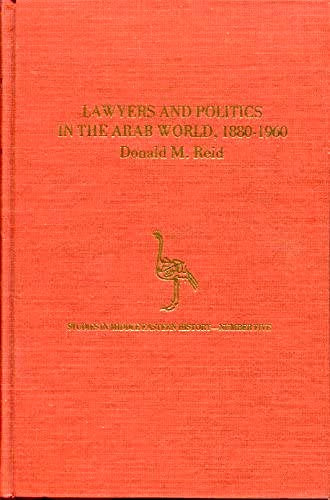 Donald M. Reid of Georgia State University documents the rise and fall of lawyers in the politics of six Middle Eastern countries (Egypt, Syria, Lebanon, Jordan, Iraq, and pre-1949 Palestine), showing their significance and indicating that they have a story more interesting than one might expect.
Donald M. Reid of Georgia State University documents the rise and fall of lawyers in the politics of six Middle Eastern countries (Egypt, Syria, Lebanon, Jordan, Iraq, and pre-1949 Palestine), showing their significance and indicating that they have a story more interesting than one might expect.
Lawyers appeared in the Middle East only a hundred years ago, when European powers acquired a major role in local politics in the area. Indigenous legal systems had given virtually no scope to lawyers, but the European powers established new court systems that required them. These new tribunals included the Mixed Courts (which handled European interests), consular courts (sponsored by European diplomatic delegations), and national courts (which covered the local population except in regard to personal status and a few other matters).
Schools of law opened to answer the need for lawyers, beginning in 1868 with the School of Administration and Languages in Egypt. Lawyers then quickly acquired political importance: "The rise of the profession in the late nineteenth and early twentieth centuries coincided precisely with the heyday of Western commerce and conquest in the Middle East" (p. 395). Reid shows how the European presence fostered this development. Lawyers dominated the parliaments sponsored by European powers after World War I, they defended local interests against European encroachments, they enjoyed the confidence of the powerful landed class, and they had vigorous writing and rhetorical skills; as a result, lawyers were able to dominate the political life of these Arab countries for a generation, from about 1930 on.
Their major role in the fight against colonialism led lawyers to expect substantial rewards in the period of independence. But they were disappointed, for the skills and connections that made them central to politics under European rule were nearly irrelevant later. Parliaments lost out to the armed forces and lawyers gave way to military officers; legal concerns lost out to economics and lawyers were pushed aside by engineers and economists. Reid chronicles the sharp decline of lawyers during the 1950s and foresees no likelihood of their return to power.
The author marshals a great mass of information in a clear and intelligent manner. But he writes in a plodding manner (for example, he ritually depends on "let us now turn to" or "we can now turn to" as a way of signaling a transition from one topic to another [pp. 13, 34, 94, and so forth]), and he overwhelms the reader with a barrage of small facts. Unless one is fascinated by the minutiae of bar association rivalries in Syria and career patterns in Jordan, four hundred pages of dense prose, charts, and tables will probably prove dauntingly long and boring.
Lawyers and Politics is the fifth volume in a series of "Studies in Middle Eastern History" published by Bibliotheca Islamica. This series also includes Reid's first book (a study of a turn-of-the-century Arab intellectual), and books on the first Persian revolution, the Aqquyunlu, and seventeenth-century judicial administration in Egypt. Scholars of the Middle East should be grateful to the publishers of Bibliotheca Islamica for making studies available that otherwise, due to their extremely narrow scope, would probably go unpublished.
Daniel Pipes
University of Chicago